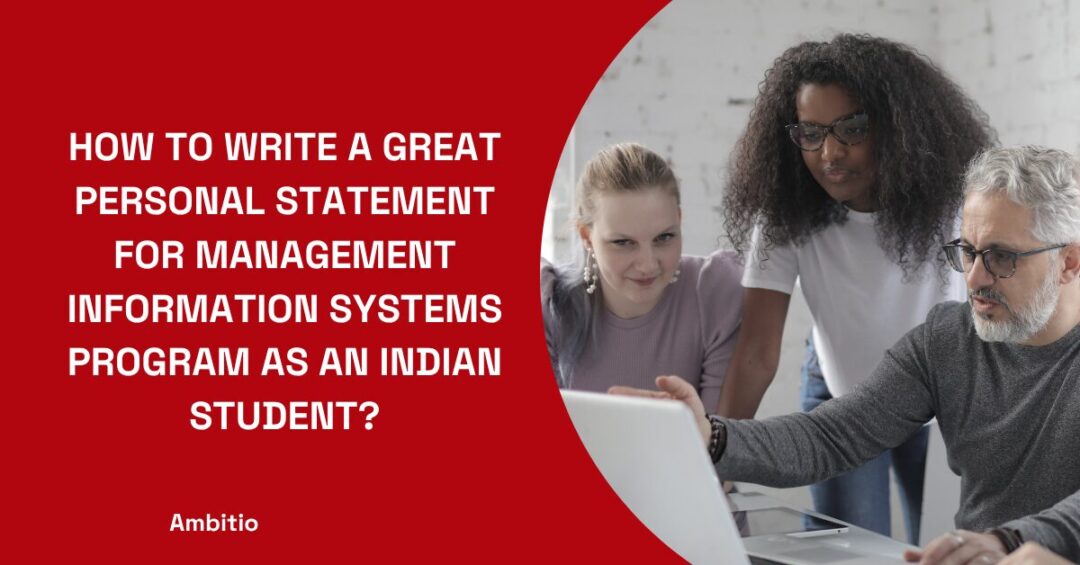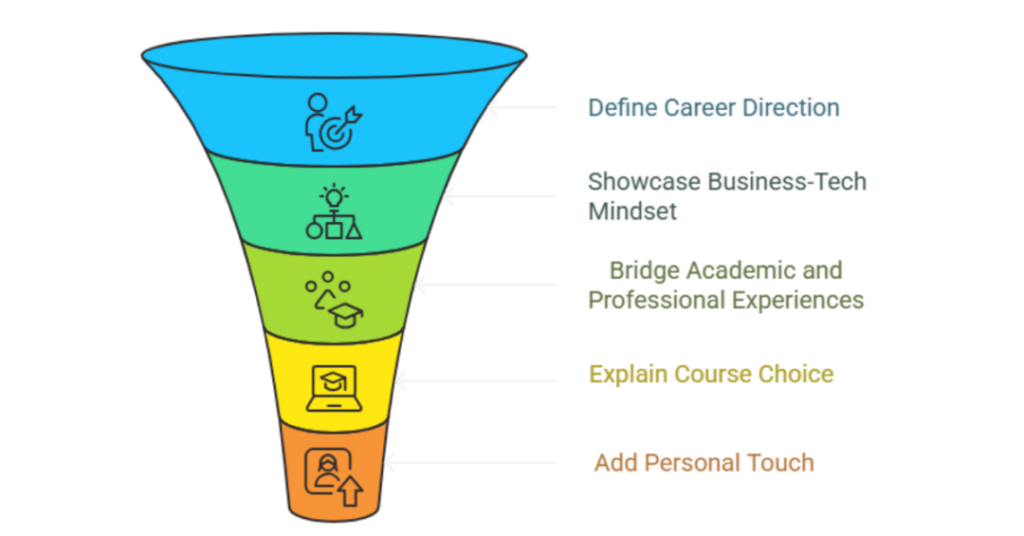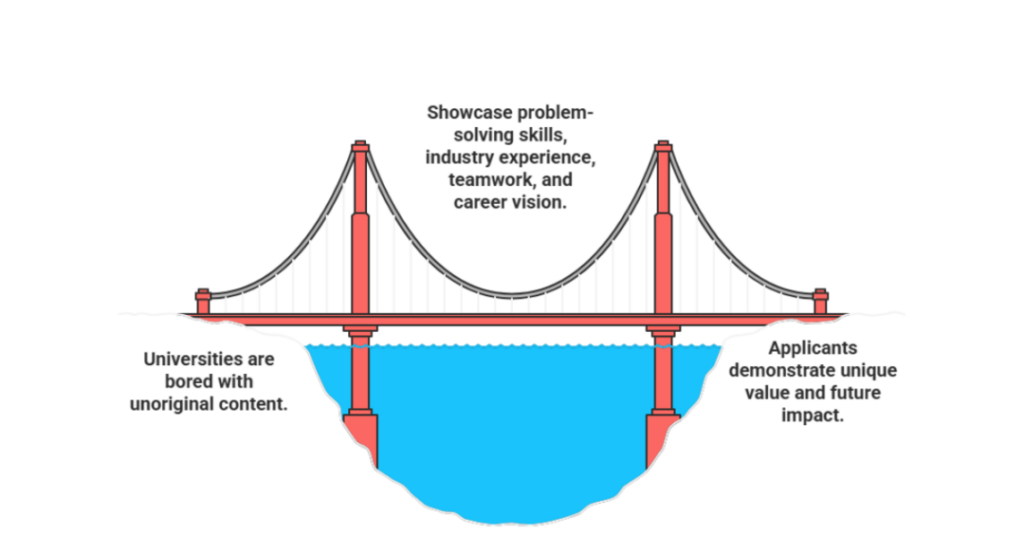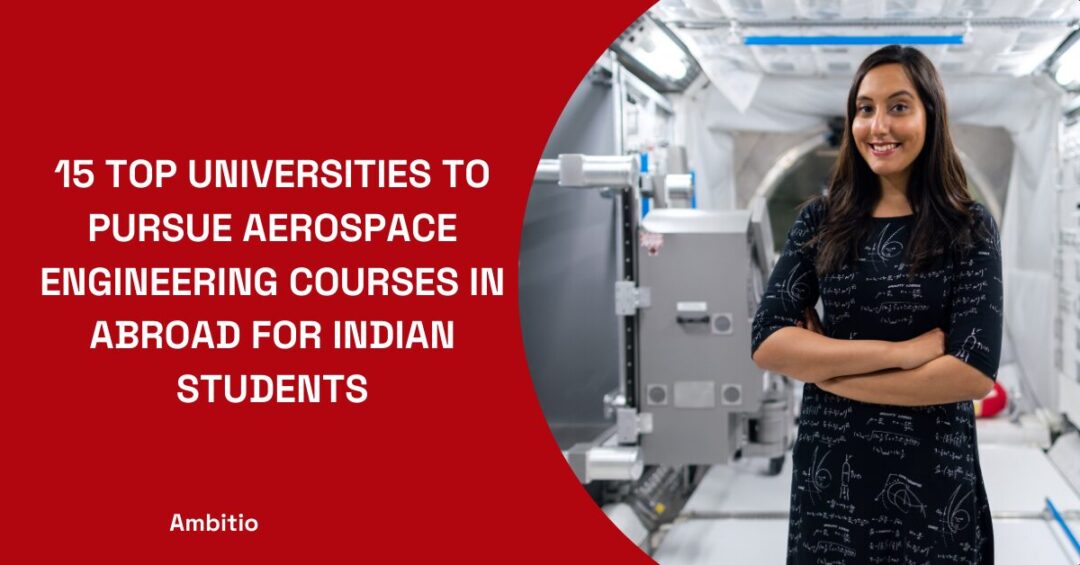1 July 2025
7 minutes read
How To Write A Great Personal Statement For Management Information Systems Program As An Indian Student?

Key Takeaways
- Treat your personal statement for management information systems like a business pitch, not a passion essay
- Show real impact through examples that combine tech skills with business outcomes
- Use clear timelines and specific roles to explain your academic and career path
97% of personal statements sound like AI wrote them, because I believe most people treat them like a formality, not a chance. Especially for Indian students applying to Management Information Systems (MIS) programs, the struggle is real: overloaded with jargon, stuffed with vague “passion for technology” lines, and missing the one thing that matters—real clarity. The problem? You’re not just competing with other smart students.
You’re up against folks who know how to sell their work experience, career goals, and obsession with analytics in 500 words. What’s the fix? Treat your personal statement like a business pitch: sharp, honest, and built around the sweet spot between technology and business. That’s what gets noticed.
What To Include In Your Personal Statement?
A test to see whether you can tell your story in a way that proves you’re not just another applicant parroting a sample personal statement. The admission committee isn’t looking for another line about your interest in information technology—they want to know if you have the skills and knowledge to thrive in a brutal, competitive, tech-powered modern business environment.

So before you even write a personal statement, read this. Because it’s the difference between sounding inspired and sounding like a LinkedIn robot.
1. Your Career Direction—Without The Vague Buzzwords
Skip “I am passionate about technology” and get straight to the point: what specific roles in charge of information systems are you aiming for? Are you planning to become a software engineer with a strategic edge? Want to manage computer information systems in a high-stakes corporate setup? The best management personal statement paints a clear path—from your bachelor’s degree to the master’s degree in management information—so the committee knows you’re not here on a whim.
2. Proof of Your Business-Tech Mindset
You’re not applying to a pure tech course. A management information system degree requires a breadth of knowledge and abilities—from data analytics to strategic management. Don’t just mention your coding skills. Show how you applied information technology and business logic to solve real problems. That mix of business management + tech = gold. If you’ve worked in information technology management, computer networking, or embedded systems, drop those examples strategically.
3. Academic + Professional Bridge Moments
Your personal and professional journey matters more than you think. The best personal statement sample doesn’t just mention internships—it talks about real-world impact. For example, if during your internship you saw how poor management methods wrecked a company’s information management pipeline, that’s a story. You’re showing you understand the management and information connection.
4. Why THIS Course, at THIS Time
Every personal statement for information should answer this: why now? Why this graduate program? Why this management msc at the university? Maybe you’re switching from an engineering personal statement background, or looking to pivot into marketing and the digital future. Tie it all together. Mention how the course you are applying to will help you achieve your future career goal—especially if you’re gunning for a master’s program in the UK like the University of Bedfordshire or University of the West.
5. A Touch of You—But Only What Matters
No, they don’t want your childhood story about your first PC. But yes, they do want a glimpse of who you are in high-pressure situations. Talk about your time management, your leadership in student clubs, your ability to adapt in chaotic business environment projects. The goal is not to entertain—it’s to prove you’re ready to pursue management roles in charge of real systems that don’t tolerate fluff.
6 Expert Tips That Make Your Personal Statement Great
Universities are bored out of their minds reading the same recycled personal statements—“I have always been fascinated by information technology…” Really? So has everyone else applying to that Management Information Systems program. What they don’t see often is a statement that’s built like a pitch deck, shows evidence of thinking, and connects the dots between computer science and the real needs of an organisation.

You’re not writing poetry here—you’re writing your career blueprint. Here’s how to make sure it actually lands.
1. Lead with Your Problem-Solving Mindset, Not Your Grades
Everyone has decent scores. What separates a solid applicant from a standout one? The ability to show how they solve real problems—be it streamlining a project management workflow or improving data handling in an outdated information system. Admissions committees want thinkers, not robots. Tell them what you fixed, not just what you studied.
2. Use Industry Lingo—But Only If You Own It
Throwing around terms like “data lake” or “ERP systems” won’t impress anyone if it sounds forced. But if you’ve genuinely worked with tools, platforms, or frameworks in a computer science or IT project, show that. When you name-drop, back it with experience—“I used XYZ to help a mid-sized organisation reduce system downtimes by 27%.” Now that’s how you flex.
3. Map Out Your “Tech for Impact” Vision
It’s not enough to say you love technology. Everyone does. You need to explain why you want to sit at the intersection of tech and business. Maybe you saw firsthand how poor information systems crushed productivity at an NGO. Maybe you led a student-led automation initiative. Whatever your reason, make it about impact. That’s what future leaders do.
4. Show How You Work in Teams, Not Just Solo
You’re not applying to be a lone hacker. The MIS field is all about collaboration—bridging the gap between tech teams and business units. Talk about your experience working in diverse groups, cross-functional teams, or leading a project where communication mattered more than code. Organisations care about people who can think and sync.
5. Frame Your Story Like a Career Timeline
Don’t list achievements randomly. Build a progression—from early exposure (like tinkering with systems), to formal learning (computer science or information technology studies), to professional application (internships, projects, freelance gigs), and finally your why now. This timeline format creates flow—and shows maturity.
6. Be Ruthlessly Specific, Not Emotionally Generic
Avoid “I’ve always dreamed of…” or “My passion lies in…”. Instead, say “During my internship with XYZ Corp, I redesigned their reporting dashboard, cutting manual input by 40%.” That tells me more about your potential than a paragraph of abstract ambition. Data, context, impact—use these three to make every sentence punch.
10 Top Universities To Study Management Information Systems
Everyone throws around “top universities for MIS” like it’s some magic list. But here’s what no one tells you: the real best schools are the ones where you get ROI. Not just a fancy campus and some AI lab in a corner—but a solid curriculum, career support, and employers who actually care that you studied there. Oh, and let’s not pretend all MIS programs are the same. Some lean tech-heavy (read: computer science), others lean towards business strategy and project management. Know what you’re signing up for.
Here’s a no-nonsense breakdown of the top 10 universities to study Management Information Systems—plus what it’ll cost you, what you’ll likely earn, and the hoops you’ll need to jump through to get in.
| University | Average Tuition Fees (per year) | Average Salary After Graduation | Required Exams | Key Documents |
|---|---|---|---|---|
| University of Arizona (Eller) | $34,000 | $92,000 | GRE/GMAT, TOEFL/IELTS | SOP, LORs, Resume, Transcripts |
| University of Texas at Austin (McCombs) | $49,000 | $102,000 | GRE or GMAT, TOEFL/IELTS | SOP, LORs, Resume, Work Experience |
| Carnegie Mellon University (Heinz) | $58,000 | $114,000 | GRE/GMAT, TOEFL/IELTS | SOP, LORs, Resume, Portfolio (if applicable) |
| University of Illinois Urbana-Champaign | $38,000 | $90,000 | GRE/GMAT, TOEFL/IELTS | SOP, LORs, Resume, Transcripts |
| Indiana University | $44,000 | $95,000 | GRE/GMAT, TOEFL/IELTS | SOP, LORs, Resume, Transcripts |
| University of Washington | $48,000 | $98,000 | GRE/GMAT, TOEFL/IELTS | SOP, LORs, Resume, Work Experience |
| New York University (Stern) | $61,000 | $110,000 | GMAT/GRE, TOEFL/IELTS | SOP, LORs, Resume, Transcripts |
| Texas A&M University (Mays) | $32,000 | $87,000 | GRE/GMAT, TOEFL/IELTS | SOP, LORs, Resume, Transcripts |
| University of Maryland (Smith) | $41,000 | $91,000 | GRE/GMAT, TOEFL/IELTS | SOP, LORs, Resume, Transcripts |
| Georgia State University (Robinson) | $30,000 | $82,000 | GRE/GMAT, TOEFL/IELTS | SOP, LORs, Resume, Transcripts |
Personal Statement Example For Information Systems Management
This personal statement sample works because it cuts the fluff and gets straight to what the admission committee actually wants: clarity, ambition, and proof that you understand what it means to lead in the world of information systems management. It doesn’t rely on generic lines or fake passion—it shows a real connection between academic and professional experience, a solid plan for the future, and how the program will give the skills and knowledge needed to survive and grow in a tough business environment.
Use this as a benchmark—not a template.
My journey into information systems management didn’t begin with a textbook—it started on the ground, fixing a chaotic inventory system for a retail chain during my internship. That project taught me that tech alone isn’t enough. What matters is how it’s applied in real business chaos.
After earning my bachelor’s degree in computer science, I joined a logistics firm where I worked with analysts to turn messy reporting into clean dashboards. The result? Faster decisions, fewer errors, and my first real exposure to business information as a competitive edge.
Working in a fast-paced startup next, I led a project integrating embedded systems with sales data to reduce delivery delays. That’s when I realized I didn’t want to just build systems—I wanted to lead them. Managing information technology and business together is where I thrive.
This MSc in Information Systems Management aligns with my goal to step into roles in charge of information systems. The mix of strategic management, data analytics, and real-world case studies is exactly what I need to grow beyond code and into impact.
I’m ready to bring my academic and professional background, not just to study—but to build solutions for the modern business world. This graduate program isn’t a step up. It’s the stage where I plan to launch the next phase of my career.
Conclusion
At last, I would just say – You need to show that you understand what the field actually demands: smart thinking, business context, and the ability to work with both data and people. Don’t hide behind buzzwords or safe stories. If you’ve done the work, just say it clearly. The more honest and specific you are, the more you’ll stand out. That’s how real applicants win.
Most applicants struggle to write a perfect personal statement but end up sounding arrogant — but you won’t. At Ambitio, our AI-powered study abroad experts help you craft a powerful, standout statement that gets noticed. No fluff, no clichés—just a compelling story that proves you belong. Schedule a call with Ambitio’s experts.

You can study at top universities worldwide!
Get expert tips and tricks to get into top universities with a free expert session.
Book Your Free 30-Minute Session Now! Book a call now




























